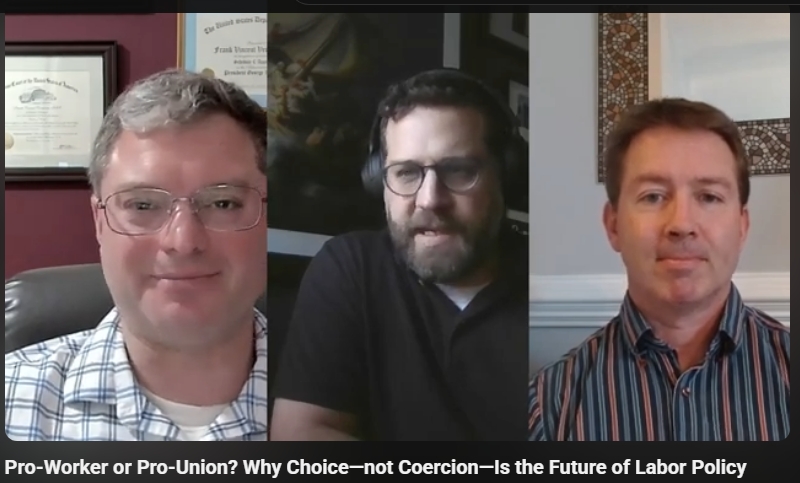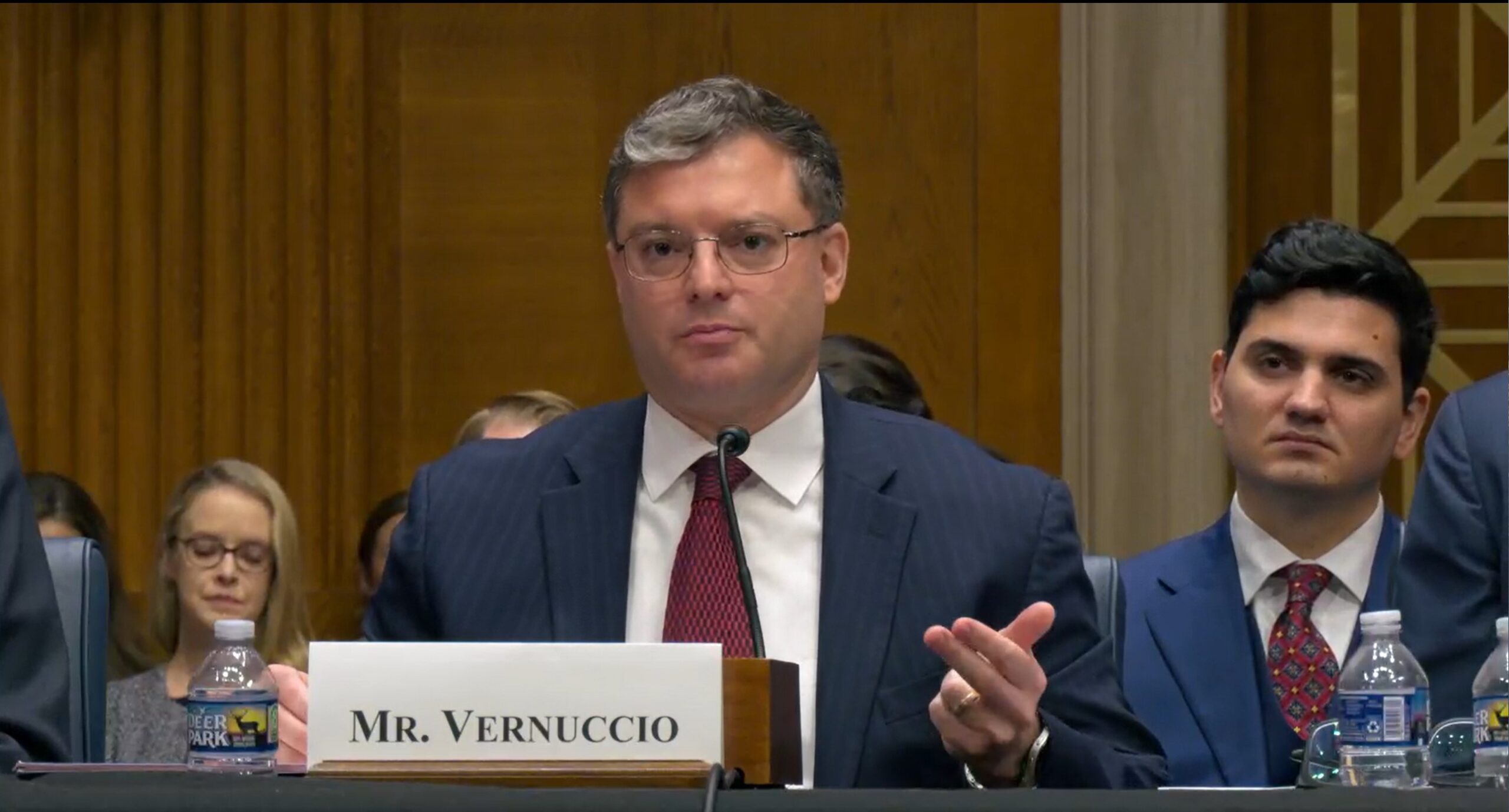Posts tagged Employee Rights Act
Webinar with The Federalist Society: Labor Law Reform on Capitol Hill: Opening Offer or Impasse?
February 17, 2026 // Last session saw no shortage of proposals in Congress for labor-law reform. In the Senate, lawmakers introduced proposals ranging from mandatory interest arbitration to bans on organizing undocumented workers. In the House, representatives proposed a range of union-democracy reforms, including a requirement for unions to poll their members before endorsing a candidate for president. And in between, scholars and practitioners offered their own ideas, including a proposal to transform the National Labor Relations Board into an article I court.

Empowering Workers in a Changing Economy with Vinnie Vernuccio | Let People Prosper Ep. 184
February 6, 2026 // Too many labor policies today assume workers need protection from choice. But the evidence shows the opposite. When workers can choose how they work, who represents them, and how they negotiate, they’re better off—economically and personally. Vinnie Vernuccio’s work reminds us that labor policy should serve workers as individuals, not institutions with political clout. If we want a labor market that adapts, innovates, and actually lifts people up, we need reforms rooted in freedom—not nostalgia.

Pro-Worker or Pro-Union? Why Choice—not Coercion—Is the Future of Labor Policy, Disunion: The Government Union Report; Commonwealth Foundation
December 18, 2025 // This week on Disunion, host David Osborne is joined by Austen Bannan of Americans for Prosperity and Vincent Vernuccio, president of the Institute for the American Worker, to break down a sweeping new report: How to Empower Workers: Embracing a Pro-Worker Agenda Built on Choice. With Congress rolling out a flurry of labor bills—from right-to-work reforms and secret ballot protections to proposals backed by unions and even some Republicans—this episode cuts through the noise. The panel explains why many so-called “pro-worker” policies actually empower union bosses and government regulators, not workers themselves.

Union members like me need these reforms from Congress
December 2, 2025 // Three years ago, I was forced into a union against my will. While my coworkers and I tried to free ourselves, we were stifled every step of the way. We needed better federal labor laws — such as the bills introduced in both the House and Senate in recent days. Leaders such as Sen. Bill Cassidy (R-LA) and Reps. Virginia Foxx (R-NC) and Randy Fine (R-FL) have recently written some of the most pro-worker legislation in decades. My own experience with unionization shows how necessary these reforms are.

Congress Can Empower Workers Through Choice—Not Coercion
November 24, 2025 // A case in point is the legislative package that Sen. Bill Cassidy (R-La.) introduced on Nov. 10, joined by others including Sens. Tommy Tuberville (R-Ala.) and Tim Scott (R-S.C). They’d protect workers’ paychecks by requiring unions to get approval before spending dues money on politics. They’d also protect workers’ privacy by letting them choose what contact information unions get during the organizing process. And they’d protect workplace democracy by requiring that at least two-thirds of workers participate in union elections — preventing a minority of people from determining the fate of every employee. Another praiseworthy reform is the Employee Rights Act, which Scott introduced in the shutdown’s early days after Rep. Rick Allen (R-Ga.) previously introduced it in the House. Among its many good ideas, the Employee Rights Act guarantees the secret ballot and protects workers from intimidation and harassment. It also gives unionized workers in the 26 right-to-work states the freedom to negotiate their own contract with their employer, so they can better address their individual needs. And the Employee Rights Act guarantees that self-employed workers have maximum flexibility to design their jobs to fit their lives.

Institute for the American Worker (I4AW) Releases “How To Empower Workers” Report
November 19, 2025 // “Workers who are equipped with an updated labor policy framework won’t need to rely on the decisions of Washington politicians or union leaders. Instead, workers will be empowered to associate with the businesses and institutions that help them lead productive and fulfilling lives in the modern economy. Through giving Americans and their families choice and flexibility, we will create the best outcomes so that everyone can chase the American Dream—without needing anyone’s permission but their own.”

RADIO: Vincent Vernuccio- Pro-Worker Labor Legislation That Promotes Worker Freedom
November 17, 2025 // Senator Bill Cassidy announced a swath of pro-worker labor legislation that promotes worker freedom and curbs undue influence and abuse by unions

Workers need the new Employee Rights Act
November 10, 2025 // The Employee Rights Act is fully aligned with Mr. Trump’s pro-worker vision. It builds on the working-class tax cuts and affordable health care reforms he has already signed. The best way to continue that progress is by fully protecting workers’ right to climb the ladder of opportunity because when they do, the rest of America rises too.
AFP Backs Transformative Labor Reform Package from Chairman Cassidy (LA) Senate HELP Committee Members
November 10, 2025 // “Americans for Prosperity thanks Senators Cassidy, Scott, and Tuberville, as well as the Senate HELP Committee, for advancing a package of reforms that will help us lead the global economy in the 21st century by empowering every worker. We do this by modernizing rigid, dated labor laws that fail to give workers the voice and transparency they deserve. These reforms will provide workers with greater choice and opportunities in the workplace to unleash prosperity and take advantage of our evolving and innovative labor market,” Austen Bannan, Employment Fellow, Americans for Prosperity.

I4AW Testifies Before Senate Labor Committee
October 27, 2025 // I4AW's Vinnie Vernuccio urged the Senate Labor Committee to support policy solutions that empower the American worker.
